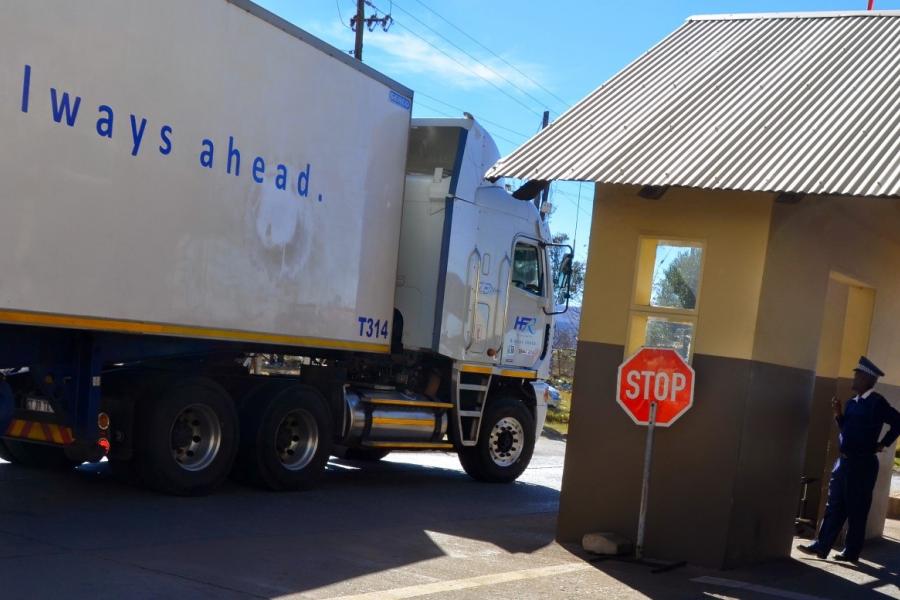Joint Statement on the Contribution of International Trade and Supply Chains to a Sustainable Socioeconomic Recovery in COVID-19 times
Work area(s)
Eight UN organizations stress critical role of international transport and integrated supply chains for COVID-19 recovery and the SDGs
We are living in an intensely interconnected world. The Coronavirus (COVID-19) pandemic has placed the world in an unprecedented situation. This crisis has generated human distress and an economic downturn that is impacting our efforts to improve livelihoods and achieve the United Nations Sustainable Development Goals (SDGs). Prior to the crisis, the maritime transport moves food, energy and raw materials, as well as manufactured goods and components, carried more than 108.9 trillion tonne-km yearly. It carried more than 80 per cent of global trade by volume, and 60 to 70 per cent of global trade value. Two million seafarers operated the world´s merchant ships. This made maritime transport vital to prosperity and sustainable development. Air transport carried about 4.5 billion passengers and 223 billion freight tonne-km in 2019,2 while airfreight represents 35 per cent of the value of goods shipped in all transport modes combined. The total number of licensed aviation professionals, which include pilots, air traffic controllers and licensed maintenance technicians, was 887,000 in 2019. 3 The inland transport modes (road, rail and inland navigation) provide vital links for intra-regional trade in all regions of the world. In the pan-European region they moved 6.15 trillion tonne-km by road, 6.09 trillion tonne-km by rail, and 654 billion tonne-km by inland waterways.
However, as the early response to restraining the spread of the COVID-19 pandemic has shown, limited coordinated action undertaken in countries which included curtailing travel and closing borders, has negatively impacted this intensely interconnected world. By this action all transport operations have been affected which has led to disruption of supply chains and trade flows. As a result, the delivery and availability of essential products such as food or medicines became a common challenge undermining countries capacity to respond to COVID-19 and begin to sustainably recover. Preliminary data and forecasts indicate severe impacts on economies worldwide, for example:
Inland transport volumes may fall by up to 40 per cent in 2020 in the pan-European region
Freight transport volumes may reduce by up to a half by the end of 2020 in most parts of Asia
Value of regional exports and import is expected to contract respectively by 23 and 25 per cent in Latin America and the Caribbean
Total losses in the revenues of airline companies from the Arab region are estimated in 2020 at about US dollars 38 billion (some 53 per cent of 2019 revenues)
African airlines may lose over US dollars 6 billion of revenue and the contribution of the industry to the GDP of countries on the continent may drop by US dollars 28 billion.
Moreover, 3.1 million jobs linked to the industry are at risk on the continent. In view of the preliminary data and the lessons learned from the pandemic so far and in order to drive socio-economic recovery and to become more resilient and sustainable, supply chains require a more effective coordination, cooperation between the transport modes, and across borders. A safe and efficient intermodal transport system is facilitated by the use of United Nations instruments, such as the United Nations TIR Convention and its eTIR International System, the CMR Convention and its eCMR Protocol and the Automated System for Customs Data (ASYCUDA). These instruments allow for moving cargo across borders without requiring physical checks and for reducing contact between people. Coordinated border management through Single Windows enable traders to communicate electronically with all agencies involved. International standards for data exchange, such as those developed by UN/CEFACT also help reduce physical contact and enhance streamlined processes. Regional cooperation on trade facilitation and transport connectivity remains vital to address specific needs and priorities, while working on aligning the solutions with the global standards.
The crisis faced by seafarers10 inability to move to and from ships needs attention to keep the maritime transport operational and to prevent disruption of supply chains. Currently, seafarers have been collateral victims of the COVID-19 crisis, as travel restrictions have left tens of thousands of them stranded on or unable to join ships. As of August 2020, it is estimated that more than 300,000 seafarers require immediate repatriation, with many more serving on extended crew contracts who are overdue to return home. A similar number of seafarers urgently need to join ships to replace them. Special attention must be given to the facilitation of entry, departure and transit of aircraft engaged in relief flights, in light of the urgent need to ensure sustainability of the global air cargo supply chain and its links with other modes to maintain the continuous availability of medical equipment as well as masks and other health and hygiene-related goods.
The United Nations Conference on Trade and Development (UNCTAD), the International Maritime Organization (IMO), the International Civil Aviation Organization (ICAO), the United Nations Economic Commission for Africa (UNECA), the United Nations Economic Commission for Europe (UNECE), the United Nations Economic Commission for Latin America and Caribbean (UNECLAC), the United Nations Economic and Social Commission for Asia and the Pacific (UNESCAP) and the United Nations Economic and Social Commission for Western Asia (UNESCWA) recall that international transport and integrated supply chains are playing a critical role in achieving the United Nations SDGs and keeping trade flowing during the global effort against COVID-19. We welcome the great efforts made by our member States in facilitating trade and transport worldwide. Still, as underscored above, we recognize the persistent challenges to trade and transport connectivity in all regions of the world. We are calling therefore on all Governments to maximize the contribution of international trade and supply chains to a sustainable socio-economic recovery in post-COVID-19 times through greater use of international legal instruments and standards, as well as strengthened regional and sectoral cooperation. We stress the importance of the implementation of globally and regionally harmonized, mutually accepted measures. These measures should be compatible with safety and security requirements, proportionate to the improvement of public health, flexible where possible (grant exemptions and waivers where appropriate) to allow for a viable economic recovery, and safeguarded so as not to distort markets. For air transport, States are invited to follow the key principles presented in the ICAO Council Aviation Recovery Task Force (CART) and implement its recommendations and guidelines. In this unprecedented situation when physical contacts are not recommended, automation and dematerialization are key enablers to trade and transport facilitation. Therefore, we support further digitalization of trade and customs procedures, using global, United Nations standards, to ensure the fast and secure exchange of data and information concerning cargo and means of transport. This needs to be coupled with accession to, and full implementation of, the United Nations legal instruments on transport, in particular those relating to transport facilitation and paperless trade.
Regional and sectoral cooperation should broker collective arrangements for dealing with pandemic response and easing up of trade and transport restrictions. In this regard, we wish to refer to United Nations Rapid Response Project on Transport and Trade Connectivity in the Age of Pandemics, which is aimed at helping the project target countries to implement United Nations solutions for contactless, seamless and collaborative international transport and trade. Recognizing a need to keep cross border trade flowing during these critical times, we encourage States to take a risk-based approach to restoring air, inland and maritime connectivity with minimal restrictions, while preventing the spread of COVID-19, protecting the health and safety of drivers, crew and border agency personnel, as well as strengthening public confidence in trade and transport means. In line with World Health Organization (WHO) recommendations, screening measures should not be used as a stand-alone measure but rather as part of a multi-layered strategy. For air transport, the implementation of a Public Health Corridor (PHC) can ensXre COVID-19 free´ air cargo, maintenance, ferr\ and delivery flight operations. International collaboration, coordination and solidarity among all is going to be key to overcoming the unprecedented global challenge posed by the pandemic and its longer-term repercussions. Collaborative efforts should also be pursued to identify and remove any unnecessary regulatory obstacles to post-pandemic recovery and to facilitate international transport and trade in these difficult times. We therefore call upon Governments to embark on the process to review international and regional trade agreements, as deemed necessary, and ensure they contain provisions to facilitate trade and transport in times of crisis and pandemics. In the longer term, some of the measures to confront the COVID-19 crisis may offer important co-benefits, for instance in terms of providing an impetus for further investment in digitalization and seamless connectivity. We call therefore upon our member States to take appropriate action in facilitating trade and transport and in maintaining the integrity of the supply chains. We also wish to reiterate our support to member States in their efforts aimed at sustainable socio-economic recovery in post-COVID-19 times for the benefit of all.
Related content
Country(ies)
- Latin America and the Caribbean

